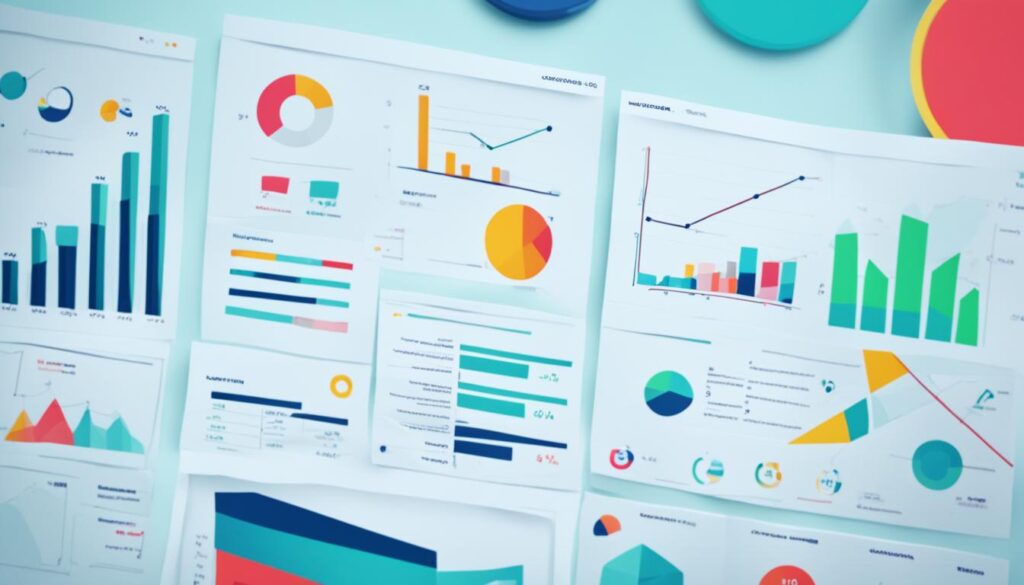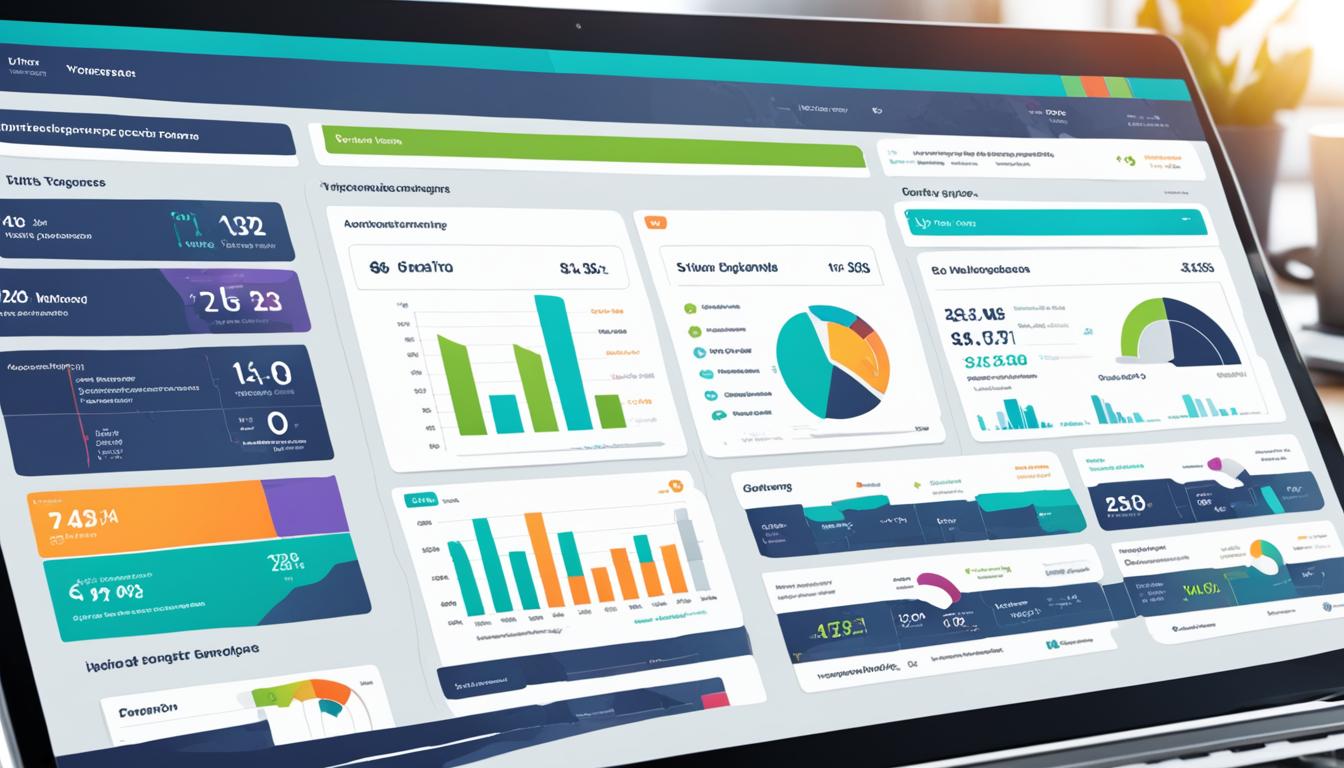Tracking Key Performance Indicators (KPIs) is crucial for measuring the success of your digital marketing efforts. KPIs are quantifiable metrics that help evaluate the performance and effectiveness of your marketing activities. They provide valuable insights into various aspects of your business, including lead generation, brand awareness, sales growth, search engine optimization (SEO), social media, paid advertising (PPC), and email marketing. By monitoring and analyzing these KPIs, you can make informed decisions to optimize your digital marketing strategies and achieve better engagement and return on investment (ROI).
Key Takeaways:
- Tracking KPIs is essential for measuring the success of your digital marketing efforts.
- KPIs provide valuable insights into lead generation, brand awareness, sales growth, SEO, social media, PPC, and email marketing.
- By monitoring KPIs, you can make informed decisions to optimize your digital marketing strategies.
- Tracking KPIs helps you achieve better engagement and return on investment.
- Optimizing your digital marketing efforts requires analyzing and understanding your KPIs.
What is a Digital Marketing KPI?
A Digital Marketing KPI is a measurable value or metric that allows marketers to assess the performance of their marketing efforts. It provides a quantifiable measure of specific aspects of your business, such as lead generation, brand awareness, sales growth, and SEO. These KPIs are directly tied to your digital marketing strategy and help you track the effectiveness and impact of your marketing activities.
Examples of digital marketing KPIs include:
- Lead generation KPIs
- Brand awareness KPIs
- Sales growth KPIs
- SEO KPIs
By tracking these KPIs, you can gain valuable insights into your marketing performance and make data-driven decisions to optimize your strategies.

“Digital marketing KPIs help you monitor, analyze, and optimize your marketing efforts.”
Why You Need to Track Your KPIs
Tracking your digital marketing KPIs is essential for several reasons. Firstly, it provides you with a clear picture of what’s working and what’s not in your marketing efforts. By understanding which channels or strategies are driving the most leads and sales, you can allocate your marketing budget effectively and focus on the most profitable areas.
For example, if you find that social media campaigns are generating a significant number of conversions while email marketing is lagging behind, you can shift more resources towards social media to maximize your returns.
Additionally, tracking KPIs enables you to measure your marketing performance and progress towards your goals. It allows you to identify trends, patterns, and areas for improvement, so you can optimize your strategies for better results.
“By regularly tracking your KPIs, you can identify bottlenecks and areas of inefficiency, allowing you to make data-driven decisions that drive growth.”
For instance, if your website’s bounce rate is high, you can investigate the underlying causes and make necessary changes to improve user experience and increase engagement.
Ultimately, tracking KPIs helps you make data-driven decisions and maximize the return on your marketing investments. It provides you with valuable insights into your target audience, customer behavior, and market trends, allowing you to tailor your strategies to meet their needs.
By continuously monitoring and analyzing your KPIs, you can stay ahead of the competition and drive the success of your digital marketing campaigns.
| KPI | Description | Benefits |
|---|---|---|
| Conversion Rate | The percentage of website visitors who complete a desired action, such as making a purchase or filling out a contact form. | Helps evaluate the effectiveness of your website and marketing campaigns, identifies areas for improvement, and indicates overall business growth. |
| Cost per Acquisition (CPA) | The average amount of money spent on acquiring a new customer. | Aids in assessing the efficiency of your marketing spend and optimizing your budget allocation. |
| Customer Lifetime Value (CLTV) | The predicted net profit generated throughout the entire customer relationship. | Allows you to identify high-value customers, tailor your marketing efforts towards them, and maximize long-term revenue. |
How to Track Your KPIs for Digital Marketing
Tracking your digital marketing KPIs is crucial for evaluating the effectiveness of your strategies and making data-driven decisions. To streamline the tracking process and access up-to-the-minute metrics, you can utilize a digital marketing reporting dashboard software. This software allows you to connect all your marketing platforms, including social media channels, PPC tools, web analytics tools, and lead conversion tools.
With a digital marketing reporting dashboard software, you can leverage a range of pre-designed report templates tailored to different KPIs. Whether you want to track SEO metrics, PPC metrics, email marketing metrics, or social media metrics, the software has you covered. This ensures that you have a comprehensive view of all the important metrics in one centralized dashboard.
By consolidating your KPIs into a single dashboard, you and your marketing team can easily monitor and analyze the performance of various marketing activities. This allows you to make data-driven decisions, identify trends, and uncover areas for improvement. Additionally, having all your metrics in one place enables you to assess the overall impact of your digital marketing efforts and make adjustments accordingly.
Whether you are tracking website traffic, conversion rates, social media engagement, or email campaign performance, a digital marketing reporting dashboard software provides a convenient and efficient way to monitor your KPIs. By leveraging this tool, you can stay informed about the performance of your digital marketing strategies and optimize them for better results.
![]()
With the help of a digital marketing reporting dashboard software, you can streamline your tracking process and access real-time metrics to guide your decision-making. By having all your important KPIs in one place, you can effectively monitor and analyze the performance of your digital marketing strategies, leading to more informed and data-driven optimization.
The Most Important Digital Marketing KPIs
The success of your digital marketing efforts relies heavily on tracking and analyzing key performance indicators (KPIs). While the specific KPIs that matter to your business may vary depending on your industry and target audience, there are several categories of KPIs that hold significant importance in the digital marketing space.
Let’s explore the key digital marketing KPIs that every marketer should monitor:
- General Marketing KPIs: These KPIs provide insights into the overall effectiveness and success of your marketing campaigns. Important metrics include customer lifetime value, customer acquisition cost, return on investment, and conversion rate.
- SEO KPIs: Search engine optimization is crucial for organic traffic and visibility. Key SEO KPIs include search traffic, keyword rankings, backlinks, domain authority, and bounce rate.
- Social Media KPIs: Social media platforms are vital for brand awareness and engagement. Measuring social media KPIs such as likes, comments, shares, and follower growth rate helps evaluate the effectiveness of your social media marketing efforts.
- Paid Advertising KPIs: Paid advertising campaigns require careful tracking to gauge their impact. Important KPIs to monitor include cost-per-click, click-through rate, and quality score.
- Email Marketing KPIs: Email marketing remains a powerful tool for nurturing leads and driving conversions. Measuring email marketing KPIs like signup rate, open rate, click-through rate, bounce rate, and unsubscribes provides insights into the success of your email campaigns.
“Without data, you’re just another person with an opinion.” – W. Edwards Deming
Tracking and analyzing these digital marketing KPIs allows you to make data-driven decisions, optimize your marketing strategies, and achieve better engagement and ROI. Each of these KPIs offers valuable insights into specific areas of your digital marketing efforts, helping you identify strengths and weaknesses and ultimately improve your overall marketing performance.
| KPI Category | Examples |
|---|---|
| General Marketing KPIs | Customer lifetime value, customer acquisition cost, return on investment, conversion rate |
| SEO KPIs | Search traffic, keyword rankings, backlinks, domain authority, bounce rate |
| Social Media KPIs | Likes, comments, shares, follower growth rate |
| Paid Advertising KPIs | Cost-per-click, click-through rate, quality score |
| Email Marketing KPIs | Signup rate, open rate, click-through rate, bounce rate, unsubscribes |
Conclusion
Tracking and monitoring the right digital marketing KPIs is essential for driving the success of your online marketing strategies. By tracking lead generation, brand awareness, sales growth, SEO, social media, paid advertising, and email marketing KPIs, you can gain valuable insights into your marketing performance and make data-driven decisions to optimize your strategies.
Choosing the right KPIs is crucial in understanding the effectiveness of your marketing efforts. Utilizing a digital marketing reporting dashboard software to track these KPIs allows you to consolidate all relevant data into a centralized platform, providing up-to-the-minute metrics whenever you need them. Regularly analyzing the results enables you to identify trends, patterns, and areas for improvement, ultimately helping you achieve better engagement, return on investment, and overall business growth.
With an optimized KPI tracking approach, you can effectively measure, evaluate, and improve your digital marketing efforts. This includes not only monitoring the performance of specific channels but also assessing the impact of your marketing activities on lead generation, brand awareness, sales growth, and SEO. By making data-driven decisions based on the insights gained from tracking and analyzing digital marketing KPIs, you can optimize your strategies, allocate your marketing budget effectively, and maximize the return on your marketing investments.
FAQ
What are Key Performance Indicators (KPIs) in digital marketing?
Key Performance Indicators, or KPIs, are quantifiable metrics that help evaluate the performance and effectiveness of your digital marketing activities.
Why is tracking KPIs important in digital marketing?
Tracking KPIs provides valuable insights into various aspects of your business and helps you make informed decisions to optimize your digital marketing strategies for better engagement and return on investment (ROI).
How can I track my digital marketing KPIs effectively?
You can track your digital marketing KPIs effectively by using a digital marketing reporting dashboard software that connects all your marketing platforms and provides tailored report templates for different KPIs.
What are some important digital marketing KPIs to monitor?
Important digital marketing KPIs include lead generation, brand awareness, sales growth, search engine optimization (SEO), social media, paid advertising (PPC), and email marketing metrics.








